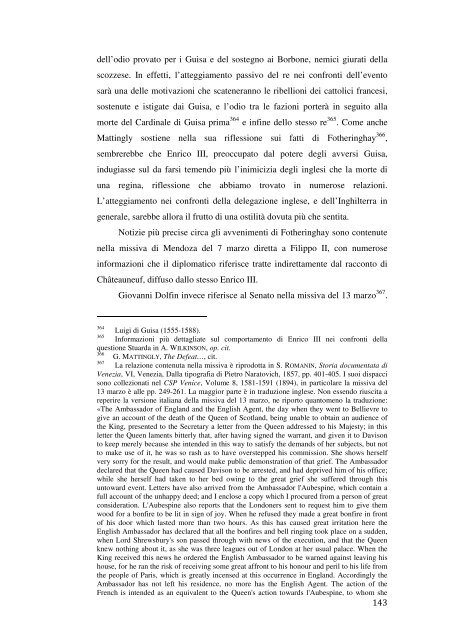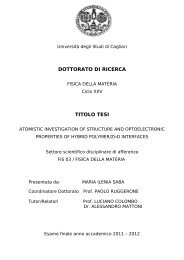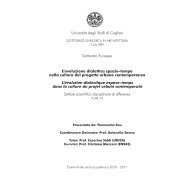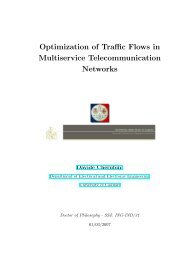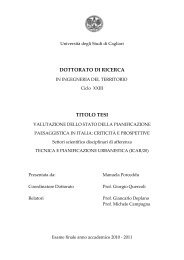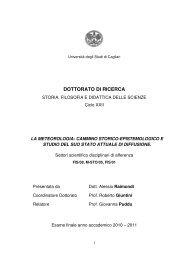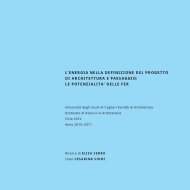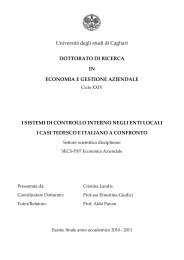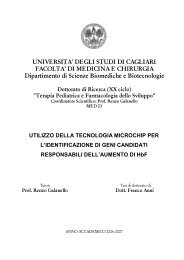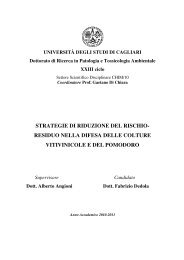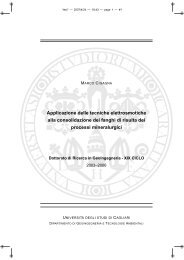Alle origini del mito letterario di Maria Stuarda in Italia
Alle origini del mito letterario di Maria Stuarda in Italia
Alle origini del mito letterario di Maria Stuarda in Italia
Create successful ePaper yourself
Turn your PDF publications into a flip-book with our unique Google optimized e-Paper software.
<strong>del</strong>l’o<strong>di</strong>o provato per i Guisa e <strong>del</strong> sostegno ai Borbone, nemici giurati <strong>del</strong>la<br />
scozzese. In effetti, l’atteggiamento passivo <strong>del</strong> re nei confronti <strong>del</strong>l’evento<br />
sarà una <strong>del</strong>le motivazioni che scateneranno le ribellioni dei cattolici francesi,<br />
sostenute e istigate dai Guisa, e l’o<strong>di</strong>o tra le fazioni porterà <strong>in</strong> seguito alla<br />
morte <strong>del</strong> Car<strong>di</strong>nale <strong>di</strong> Guisa prima 364 e <strong>in</strong>f<strong>in</strong>e <strong>del</strong>lo stesso re 365 . Come anche<br />
Matt<strong>in</strong>gly sostiene nella sua riflessione sui fatti <strong>di</strong> Fother<strong>in</strong>ghay 366 ,<br />
sembrerebbe che Enrico III, preoccupato dal potere degli avversi Guisa,<br />
<strong>in</strong>dugiasse sul da farsi temendo più l’<strong>in</strong>imicizia degli <strong>in</strong>glesi che la morte <strong>di</strong><br />
una reg<strong>in</strong>a, riflessione che abbiamo trovato <strong>in</strong> numerose relazioni.<br />
L’atteggiamento nei confronti <strong>del</strong>la <strong>del</strong>egazione <strong>in</strong>glese, e <strong>del</strong>l’Inghilterra <strong>in</strong><br />
generale, sarebbe allora il frutto <strong>di</strong> una ostilità dovuta più che sentita.<br />
Notizie più precise circa gli avvenimenti <strong>di</strong> Fother<strong>in</strong>ghay sono contenute<br />
nella missiva <strong>di</strong> Mendoza <strong>del</strong> 7 marzo <strong>di</strong>retta a Filippo II, con numerose<br />
<strong>in</strong>formazioni che il <strong>di</strong>plomatico riferisce tratte <strong>in</strong><strong>di</strong>rettamente dal racconto <strong>di</strong><br />
Châteauneuf, <strong>di</strong>ffuso dallo stesso Enrico III.<br />
Giovanni Dolf<strong>in</strong> <strong>in</strong>vece riferisce al Senato nella missiva <strong>del</strong> 13 marzo 367 .<br />
364 Luigi <strong>di</strong> Guisa (1555-1588).<br />
365 Informazioni più dettagliate sul comportamento <strong>di</strong> Enrico III nei confronti <strong>del</strong>la<br />
questione <strong>Stuarda</strong> <strong>in</strong> A. WILKINSON, op. cit.<br />
366 G. MATTINGLY, The Defeat…, cit.<br />
367 La relazione contenuta nella missiva è riprodotta <strong>in</strong> S. ROMANIN, Storia documentata <strong>di</strong><br />
Venezia, VI, Venezia, Dalla tipografia <strong>di</strong> Pietro Naratovich, 1857, pp. 401-405. I suoi <strong>di</strong>spacci<br />
sono collezionati nel CSP Venice, Volume 8, 1581-1591 (1894), <strong>in</strong> particolare la missiva <strong>del</strong><br />
13 marzo è alle pp. 249-261. La maggior parte è <strong>in</strong> traduzione <strong>in</strong>glese. Non essendo riuscita a<br />
reperire la versione italiana <strong>del</strong>la missiva <strong>del</strong> 13 marzo, ne riporto quantomeno la traduzione:<br />
«The Ambassador of England and the English Agent, the day when they went to Bellievre to<br />
give an account of the death of the Queen of Scotland, be<strong>in</strong>g unable to obta<strong>in</strong> an au<strong>di</strong>ence of<br />
the K<strong>in</strong>g, presented to the Secretary a letter from the Queen addressed to his Majesty; <strong>in</strong> this<br />
letter the Queen laments bitterly that, after hav<strong>in</strong>g signed the warrant, and given it to Davison<br />
to keep merely because she <strong>in</strong>tended <strong>in</strong> this way to satisfy the demands of her subjects, but not<br />
to make use of it, he was so rash as to have overstepped his commission. She shows herself<br />
very sorry for the result, and would make public demonstration of that grief. The Ambassador<br />
declared that the Queen had caused Davison to be arrested, and had deprived him of his office;<br />
while she herself had taken to her bed ow<strong>in</strong>g to the great grief she suffered through this<br />
untoward event. Letters have also arrived from the Ambassador l'Aubesp<strong>in</strong>e, which conta<strong>in</strong> a<br />
full account of the unhappy deed; and I enclose a copy which I procured from a person of great<br />
consideration. L'Aubesp<strong>in</strong>e also reports that the Londoners sent to request him to give them<br />
wood for a bonfire to be lit <strong>in</strong> sign of joy. When he refused they made a great bonfire <strong>in</strong> front<br />
of his door which lasted more than two hours. As this has caused great irritation here the<br />
English Ambassador has declared that all the bonfires and bell r<strong>in</strong>g<strong>in</strong>g took place on a sudden,<br />
when Lord Shrewsbury's son passed through with news of the execution, and that the Queen<br />
knew noth<strong>in</strong>g about it, as she was three leagues out of London at her usual palace. When the<br />
K<strong>in</strong>g received this news he ordered the English Ambassador to be warned aga<strong>in</strong>st leav<strong>in</strong>g his<br />
house, for he ran the risk of receiv<strong>in</strong>g some great affront to his honour and peril to his life from<br />
the people of Paris, which is greatly <strong>in</strong>censed at this occurrence <strong>in</strong> England. Accor<strong>di</strong>ngly the<br />
Ambassador has not left his residence, no more has the English Agent. The action of the<br />
French is <strong>in</strong>tended as an equivalent to the Queen's action towards l'Aubesp<strong>in</strong>e, to whom she<br />
143


